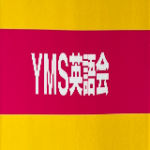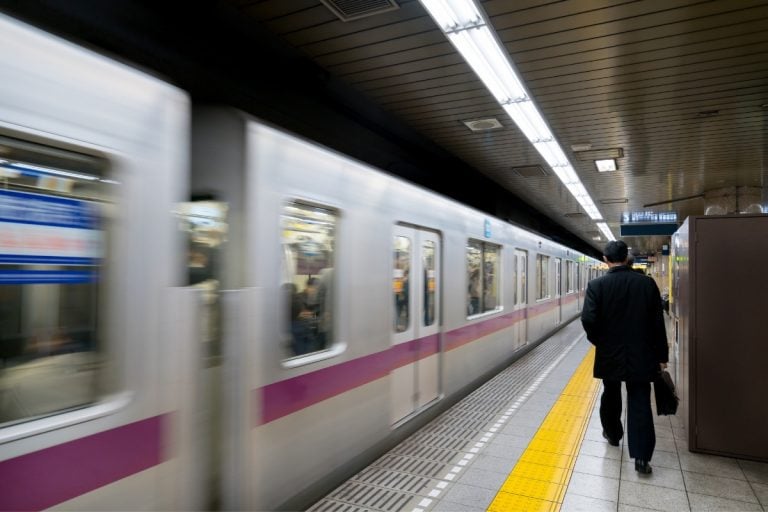
It happens to all of us… one moment you’re having a great time, the next you realize it’s five minutes to midnight, and like Cinderella at the ball, you have to run. But… you don’t quite make it in time and your last train has left faster than you can say bippity boppity boo. Now, you’re in the middle of Tokyo with no easy way to get home. What to do? Staying on the streets is not recommended, as, despite Tokyo’s safe reputation, there are plenty of thieves looking for sleeping targets. So, here are 10 options, rated by comfort, price, and convenience.
1. Pay Big Bucks for a Taxi
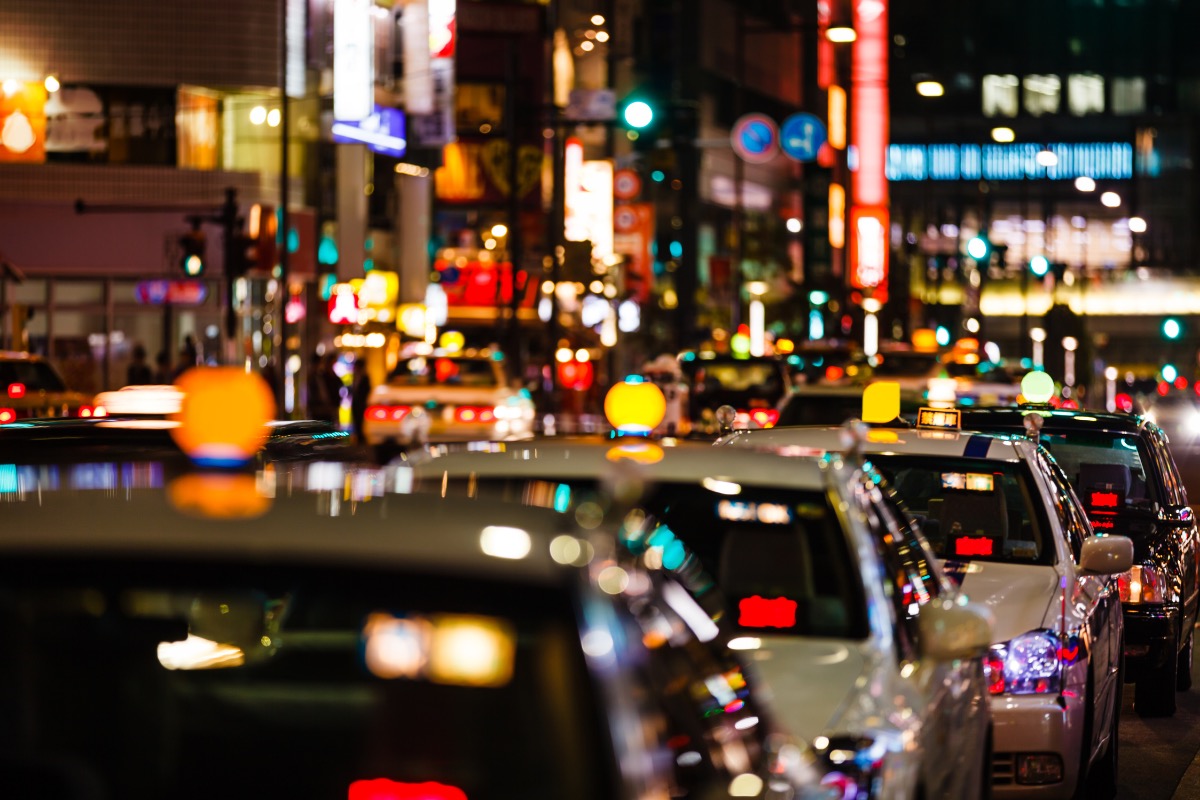
- Price: ¥¥¥, around ¥4000 for a 30 min ride.>/li>
- Convenience: 10/10
- Comfort: 10/10, you get to sleep in your own bed.
Tokyo’s taxis have a reputation for being pricey—and for good reason, the costs start at ¥400-¥700 for the initial couple kilometers, then increase by ¥80-¥90 for every extra 300-400 meters. There is also an extra 20% nighttime fee from 10:00 PM to 5:00 AM.
However, if you have the cash, it’s the most convenient option. You can flag a taxi down from a main road, or find a taxi stop (near many stations). It’s best to pay in cash, as many taxis do not accept credit cards. Another option is Uber, which in Japan is just a service to call a taxi, although Uber does not have the nighttime surcharge.
2. Ride Home on a Rental Bike
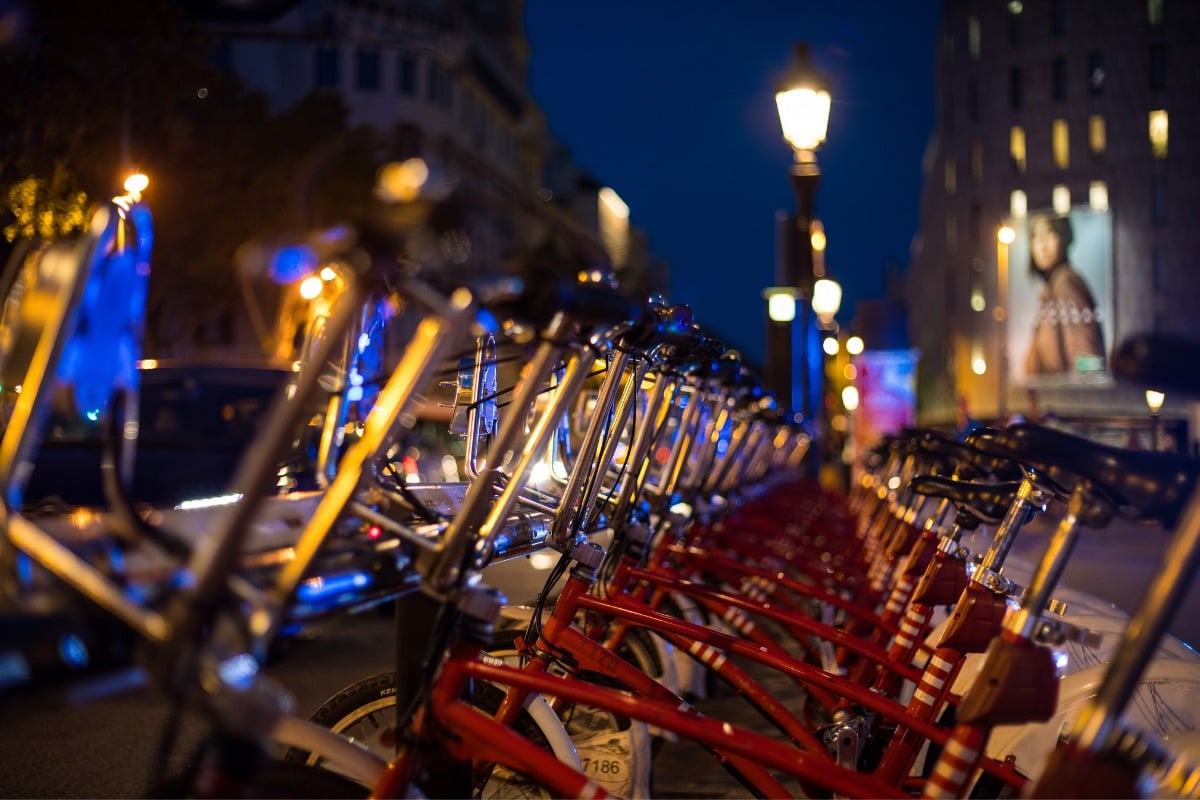
- Price: ¥, around ¥1000- ¥1500 per day, although some rentals offer hourly plans.
- Convenience: 7/10
- Comfort: 7/10, you can sleep in your own bed, but only once you get there.
Recently, electric bike shares have gained popularity with docking ports all around Tokyo. You can rent the shared bikes through apps, like Cogi Cogi or through an online registration like Community Cycle. If there’s a bike docking port near you, and another near your destination, then an e-bike could be a good option for getting home once the trains have stopped running.
3. Recharge at a McDonald’s (and other 24h chains)

- Price: ¥, from around ¥100
- Convenience: 7/10
- Comfort: 4/10
McDonald’s has free wifi, outlets, bathrooms, and cheap coffee — what else could you need to while the night away? Most McDonalds are open 24/7, so you can wait there until the morning train arrives. While you may not get much sleep, it is one of the cheapest options on this list. Other chain restaurants open 24h include Denny’s and Gusto.
Note: during the state of Emergency in Tokyo due to Covid-19, many restaurants are not allowing dine-in guests past 8:00 PM.
4. Chill at a Conbini
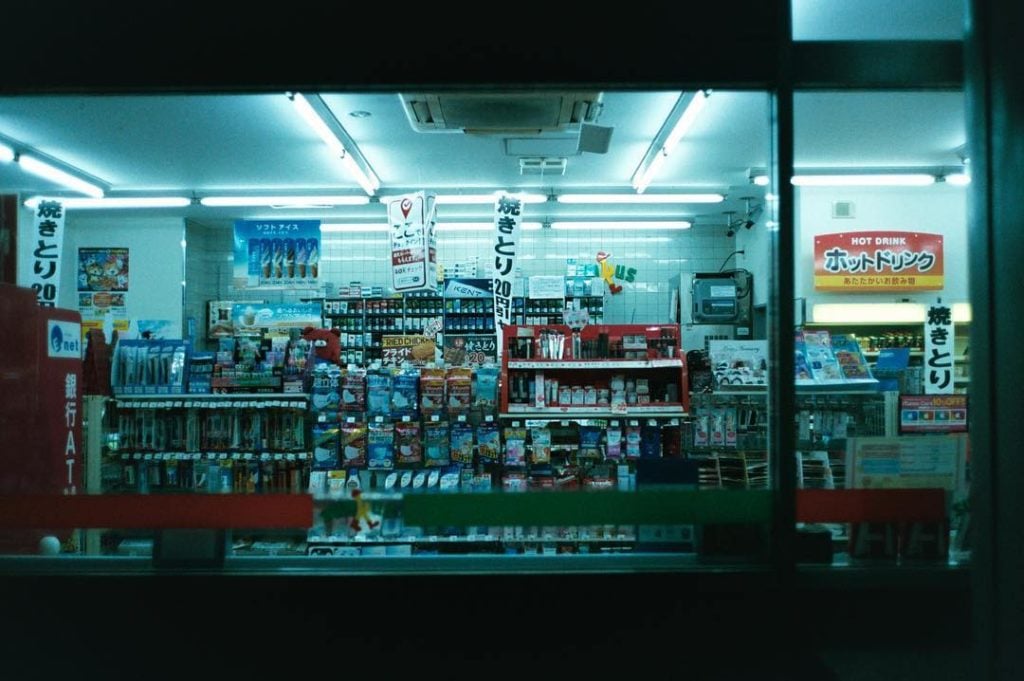
- Price: ¥, from around ¥100
- Convenience: 8/10, you’ll always be able to find one nearby.
- Comfort: 3/10
When my friends missed the last train after attending the Fuji-rock festival*, the conbini staff let them camp out inside, and even let them use the store’s outlets to recharge their phones. They might not quite be so understanding at all convenience stores, but conbini can be a great place to while away the time, browsing magazines, using the bathroom, and stocking up on snacks.
5. Sing the Night Away at a Karaoke Parlor

- Price: ¥¥, ¥1500 for an entire night (¥200 – ¥300 per hour)
- Convenience: 5/10
- Comfort: 4/10
If you’re out with friends and don’t want the night to end, just sing until morning instead. Karaoke parlors usually offer special shihatsu (first train) plans. For around ¥1500, you get a private room where you can sing loud as you’d like, and order food and drink all night long (some plans come with unlimited drinks). Plus, you’re really tired, the booth can be a makeshift bed.
6. Get Cultured at a Manga Cafe
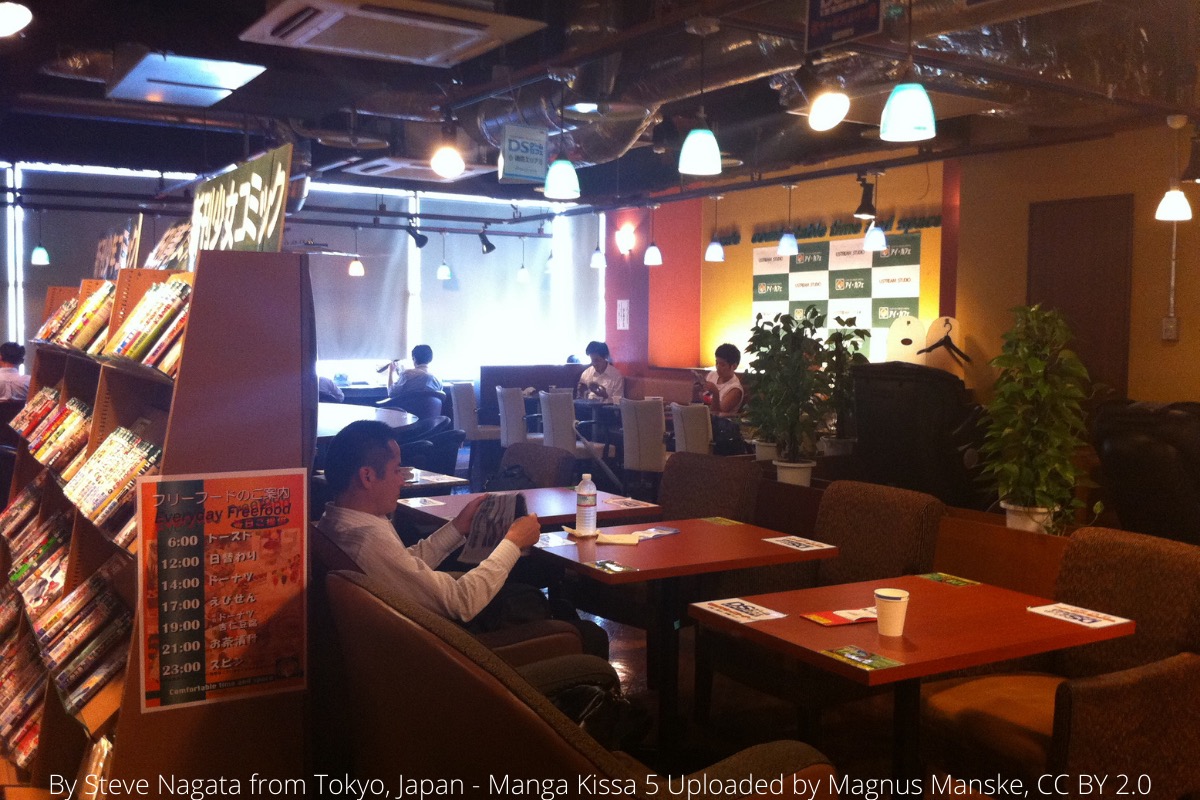
- Price: ¥¥, around ¥1200 for an entire night (¥300 per hour)
- Convenience: 5/10
- Comfort: 5/10
Manga Kissa, or Manga cafes, as the name suggests, have shelves packed with manga for you to enjoy. But it’s not just about the books, the ¥300/h rate also gets you a private booth, with a reclining chair and a PC connected to the internet—much more comfortable than a McDonald’s table. The plans also usually include unlimited soft drinks, and sometimes even unlimited snacks.
7. Soak in an All-Night Onsen/Super Sento

- Price: ¥¥¥ from around ¥3,000 – ¥4,000
- Convenience: 4/10, not all onsen go all night
- Comfort: 8/10
What better way to end a night out than with a warm bath? Many onsen and sento around Tokyo are open all night long, making them a good place to rest until morning.
Some onsen come with their own capsule hotels, where you can spend the night in bed, but for an extra fee. Otherwise, most onsen and sento have resting rooms with reclining chairs and/or tatami rooms, with mats you can stretch out on.
8. Cozy up in a Capsule Hotel
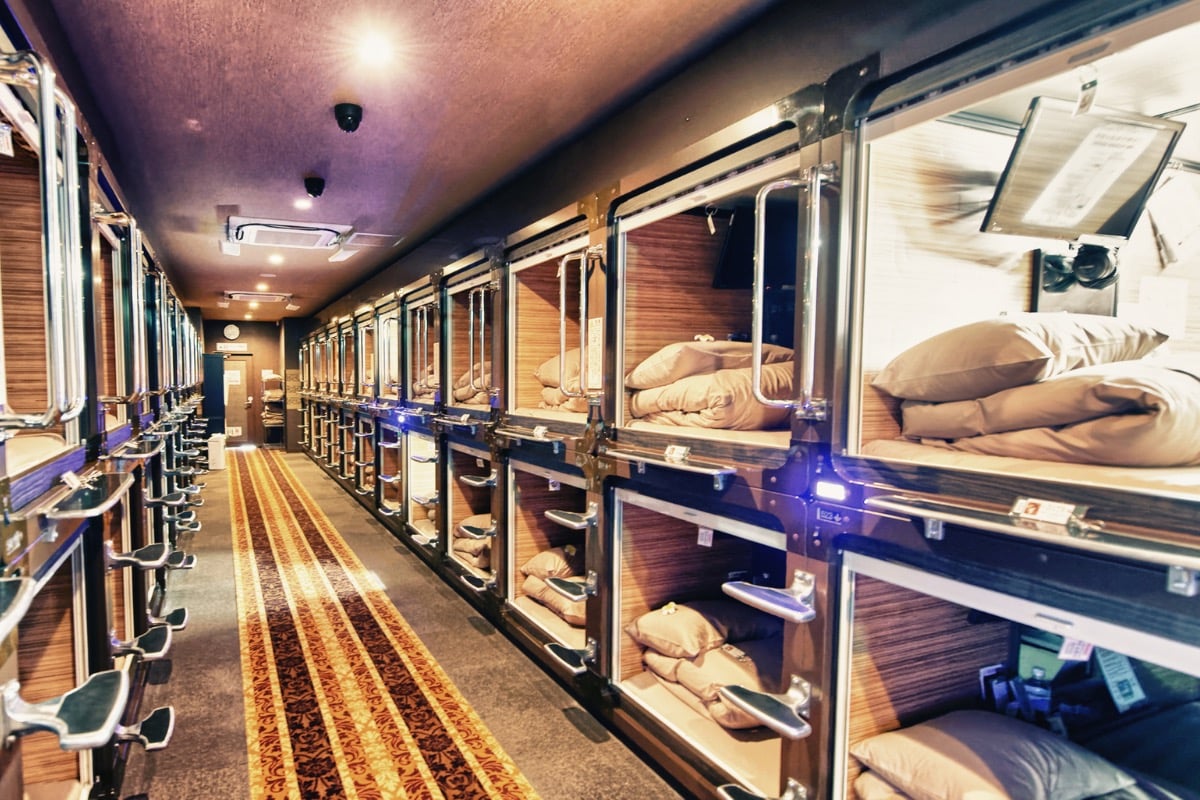
- Price: ¥¥¥, from around ¥2,500 to ¥6,000
- Convenience: 5/10
- Comfort: 7/10, as long as you aren’t claustrophobic.
These sci-fi-style cubbies may not be the most comfortable, but they’ve long been the salaryman’s standby for a last-minute bed in Tokyo. Capsule hotels can be found near the city’s major stations and popular neighborhoods like Shinjuku and Shibuya.
9. Find Romance at a Love Hotel

- Price: ¥¥¥, ¥3,000 or more for 2 – 3 hours, ¥8,000 or more to stay the night
- Convenience: 6/10 You may need a partner, depending on the hotel
- Comfort: 8/10, depending on the hotel
Love hotels have a steamy reputation, but they can be a good place to rest your head for the night, or even just a few hours. The hotel rooms can range from simple beds to extensive suites (some including private jacuzzis). Love hotels are one of the most comfortable options when you’re stuck in the city. Plus, if you’re already located in one of Tokyo’s nightlife districts, finding one should be easy. However, some love hotels only allow you to stay if you’re with a partner.
10. If in Danger, Go to the Police
Finally, if you feel as though you are in a dangerous situation, or are truly desperate, you can look for the nearest police box (called koban, 交番), often located near train stations. If you are polite and explain your situation, they should help you find a solution. My friend, who had gotten lost in Tokyo without any money, or even a working phone, was able to get help at a koban. For emergencies, call 110 for the police and 119 for an ambulance.














